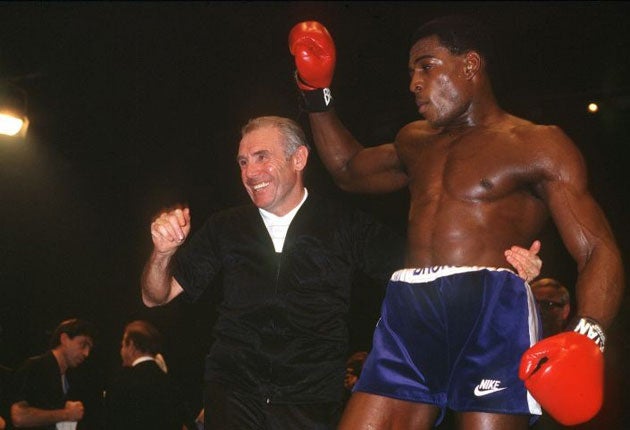Terry Lawless: Boxing trainer and manager who took four fighters to world titles

Terry Lawless never laced a pair of boxing gloves on in his entire life but his simple methods, common sense in the gym and connections helped him become the last of the old-fashioned boxing managers. Lawless ran a gym above the Royal Oak pub on the Barking Road in Canning Town, not too far from where he was born in West Ham, in the 1970s and '80s. It was an old-school establishment and Lawless was a perfect fit to run an outpost for the game's fading traditions, having spent the end of the '50s and '60s playing a supporting role in the boxing business.
Frank Bruno is arguably the most famous of the young fighters that Lawless and his fluid training team of Frank Black, Jimmy Tibbs and George Francis moulded and shaped. Bruno arrived at the Royal Oak when he was 20 and was guided and rebuilt by Lawless and his men during an entertaining decade and nearly 40 fights.
"Terry was a boxing man, who ran things his way," wrote Bruno in his last, most honest and best autobiography. "He never left the East End and he surrounded himself with people he knew and trusted." It was Lawless who arranged the trip to Bogota for Bruno to have surgery on his eye before the young south Londoner could even turn professional; it was Lawless who entered the ring with a white towel of surrender during the first and second of Bruno's failed world title attempts.
There are too many cynical veterans of the boxing game who claim to have treated their fighters like sons, but it is just possible that Lawless came closest to making the cliché a reality. His partners in the boxing business were understandably frustrated whenever a mildly competitive fight was rejected by Lawless. There was an altercation in the late Eighties when Mike Barrett, a promoter of note at the time, screamed at Lawless and accused him of wanting his fighters to win every fight. Lawless is said to have looked at him with a degree of pity and replied: "Yes, of course I do."
Barrett was actually a partner with Lawless in a legal boxing cartel that enjoyed an extended and often bewildering exclusive deal with the BBC throughout most of the '70s and '80s. The other two members of the controversial cartel were the infamous fight figure Mickey Duff and promoter Jarvis Astaire, and the quartet combined beautifully to dominate British boxing for 15 glorious years.
However, it was the Lawless conveyor belt of fighters that made it all possible, and the trainer established firm relationships with London amateur boxing clubs, like Repton and Fitzroy Lodge, to keep the supply of talent of flowing. There was never any doubting the commitment and enthusiasm of Lawless once the training, the part he really liked, started in the gym.
"Terry is hard work at times and we often fall out," Duff admitted during one of the regular debates that followed several Bruno massacres. "Terry's job was to get the best money and the worst opponent, and when you suggest an opponent, his immediate reaction is 'no'."
It is possible that during the last 20 years too much emphasis has been placed on the dubious success of the cartel and not enough on the work Lawless did at his gym. In addition to picking up Bruno, dusting him off and building him back up after losses, there was the work with his four world champions. John H. Stracey, the last East End boxing hero, became his first world champion in 1975 when he beat the Cuban legend Jose Napoles in Mexico City. It was Stracey's 47th fight and Lawless and his partners had promoted him quite brilliantly.
In the space of 44 days in 1979, Lawless trained two more fighters to world titles. First, Maurice Hope, like Stracey a former Repton boxer, and then Jim Watt won titles. Lawless enhanced his reputation as a maker of champions because a few years earlier Hope had been knocked out in a British title fight and Watt was having his 41st fight and had previously lost seven times.
In 1983 Lawless had his fourth and final world champion when Charlie Magri won the flyweight title just a year after a sickening knock-out loss. Once again Lawless had worked his magic in the corner, a small space where for 60 golden seconds between rounds he came into his own, and his partners had done their bit to make the fight happen.
In the end Bruno walked away, Stracey and Magri left, Barrett was bought out of the cartel and Lawless started to fade from the scene by the late 1990s. Sadly, too many of his tributes have been made through gritted teeth, and he deserves to be remembered as the last and one of the very best of the old-timers; men who understood the way the boxing world really works.
Lawless died early on Christmas Eve following complications from a gall bladder operation in Spain, where he had been living with Sylvia, his wife of 53 years.
Steve Bunce
Terry Lawless, boxing manager and trainer: born London 29 March 1933; married Sylvia (one son, one daughter); died Marbella, Spain 24 December 2009.
Join our commenting forum
Join thought-provoking conversations, follow other Independent readers and see their replies
Comments
Bookmark popover
Removed from bookmarks